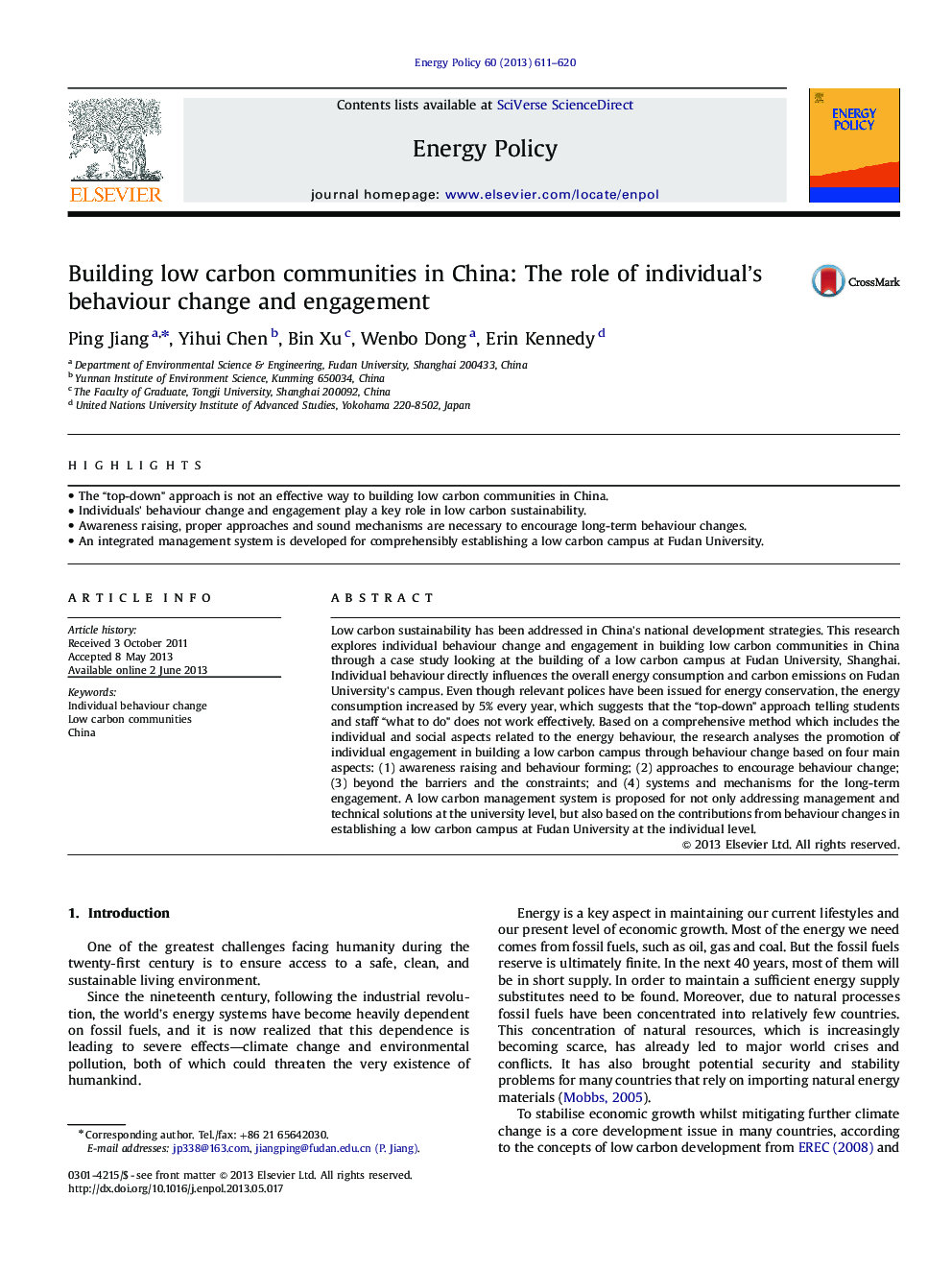| کد مقاله | کد نشریه | سال انتشار | مقاله انگلیسی | نسخه تمام متن |
|---|---|---|---|---|
| 7404991 | 1481298 | 2013 | 10 صفحه PDF | دانلود رایگان |
عنوان انگلیسی مقاله ISI
Building low carbon communities in China: The role of individual's behaviour change and engagement
ترجمه فارسی عنوان
ایجاد جوامع کم کربن در چین: نقش تغییر رفتار فرد و تعامل
دانلود مقاله + سفارش ترجمه
دانلود مقاله ISI انگلیسی
رایگان برای ایرانیان
کلمات کلیدی
تغییر رفتار فردی، جوامع کربن کم، چین،
ترجمه چکیده
پایداری کربن پایین در استراتژی های توسعه ملی چین مورد توجه قرار گرفته است. این تحقیق، تغییر رفتار فردی و مشارکت در ایجاد جوامع کم کربن در چین را از طریق مطالعه موردی به دنبال ساخت یک پردیس کم کربن در دانشگاه فودان، شانگهای، بررسی می کند. رفتار فردی به طور کلی بر میزان مصرف کلی انرژی و انتشار کربن در محوطه دانشگاه فودان تاثیر می گذارد. با وجودی که سیاست های مربوط به حفاظت از انرژی صادر شده است، مصرف انرژی هر ساله 5 درصد افزایش می یابد، که نشان می دهد که بالا رفتن؟ رویکرد به دانشجویان و کارکنان چه خبر است؟ کار درستی نمی کند بر اساس یک روش جامع که شامل ابعاد فردی و اجتماعی مربوط به رفتار انرژی است، پژوهش، ارتقاء مشارکت فردی در ایجاد یک پردیس کم کربن را از طریق تغییر رفتار بر اساس چهار جنبه اصلی انجام می دهد: (1) بالا بردن سطح آگاهی و رفتار؛ (2) رویکرد برای تشویق تغییر رفتار؛ (3) فراتر از موانع و محدودیت ها؛ و (4) سیستم ها و مکانیزم های تعامل بلند مدت. یک سیستم مدیریت کربن کم برای ارائه نه تنها به مدیریت و راه حل های فنی در سطح دانشگاه پیشنهاد می شود، بلکه بر اساس مشارکت از تغییر رفتار در ایجاد یک پردیس کم کربن در دانشگاه فودان در سطح فردی ارائه شده است.
موضوعات مرتبط
مهندسی و علوم پایه
مهندسی انرژی
مهندسی انرژی و فناوری های برق
چکیده انگلیسی
Low carbon sustainability has been addressed in China's national development strategies. This research explores individual behaviour change and engagement in building low carbon communities in China through a case study looking at the building of a low carbon campus at Fudan University, Shanghai. Individual behaviour directly influences the overall energy consumption and carbon emissions on Fudan University's campus. Even though relevant polices have been issued for energy conservation, the energy consumption increased by 5% every year, which suggests that the “top-down” approach telling students and staff “what to do” does not work effectively. Based on a comprehensive method which includes the individual and social aspects related to the energy behaviour, the research analyses the promotion of individual engagement in building a low carbon campus through behaviour change based on four main aspects: (1) awareness raising and behaviour forming; (2) approaches to encourage behaviour change; (3) beyond the barriers and the constraints; and (4) systems and mechanisms for the long-term engagement. A low carbon management system is proposed for not only addressing management and technical solutions at the university level, but also based on the contributions from behaviour changes in establishing a low carbon campus at Fudan University at the individual level.
ناشر
Database: Elsevier - ScienceDirect (ساینس دایرکت)
Journal: Energy Policy - Volume 60, September 2013, Pages 611-620
Journal: Energy Policy - Volume 60, September 2013, Pages 611-620
نویسندگان
Ping Jiang, Yihui Chen, Bin Xu, Wenbo Dong, Erin Kennedy,
